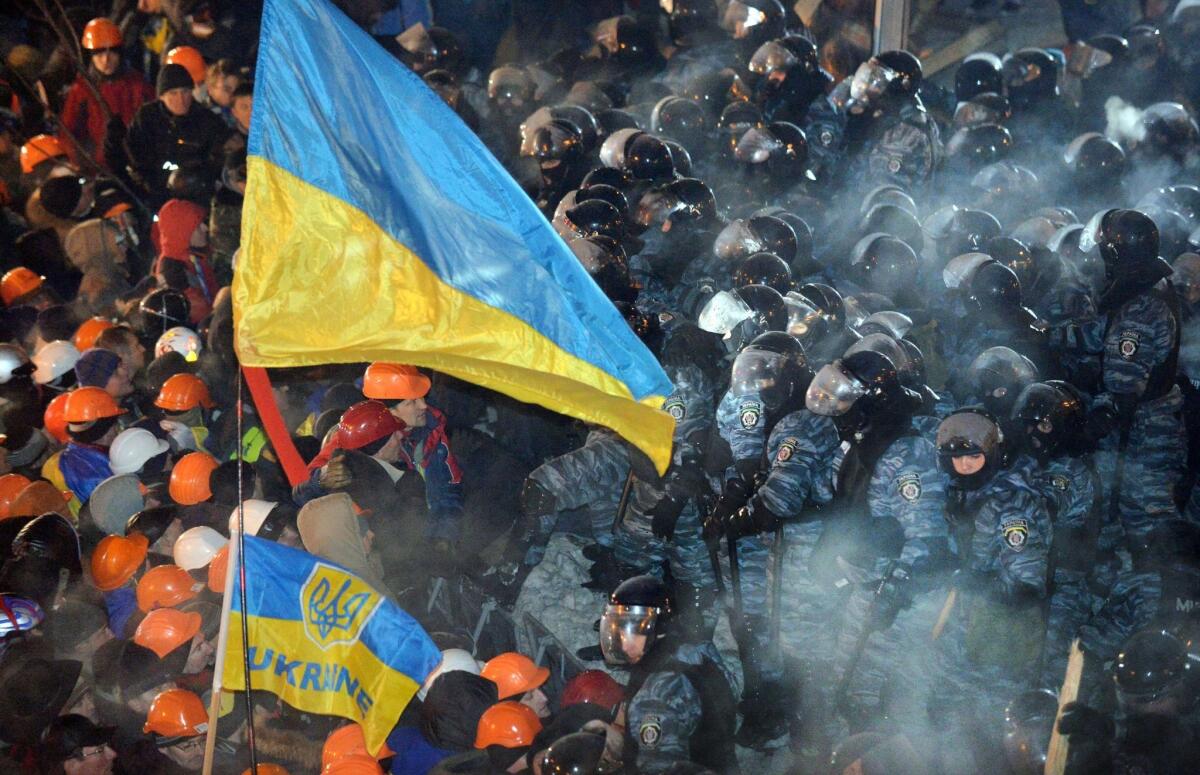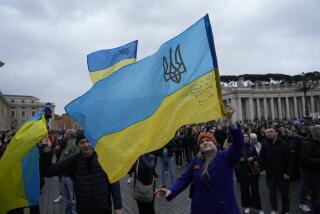Ukraine protesters clash with police, demand president’s resignation

- Share via
KIEV, Ukraine -- Ukrainian riot police used force in an attempt to disperse protesters in downtown Kiev on Wednesday, further stoking opposition leaders, who vowed to coax hundreds of thousands into the streets, rejected more negotiations and demanded President Viktor Yanukovich’s resignation.
“There can be no compromises with thugs and dictators,” Vitali Klitschko, a world heavyweight boxing champion and an opposition leader said in a statement published Wednesday on his party’s official website. “Today question number one is unquestionably the resignation of Yanukovich and his entire rotten administration.”
The protests, now in their third week, have become the worst political crisis in Ukraine since the 2004 Orange Revolution. Protesters outraged by the president’s decision last month to scrap an agreement that would have improved trade and other relations with the European Union in favor of closer ties with Russia have been occupying the historic center of the Ukrainian capital for three weeks.
The U.S. State Department called the overnight police operation disgusting and appealed for restraint.
“The United States expresses its disgust with the decision of Ukrainian authorities to meet the peaceful protest in [Kiev’s] Maidan Square with riot police, tear gas, and batons, rather than with respect for democratic rights and human dignity,” Secretary of State John F. Kerry said in a statement. “This response is neither acceptable nor does it befit a democracy.”
Ukraine’s police command, which pledged the day before not to use force against protesters, early Wednesday deployed several thousand riot police and interior troops armed with clubs and shields around Independence Square. The police closed in to push several thousand protesters from adjacent streets into a tent camp in the middle of the square.
Several dozen opposition leaders and lawmakers formed human chains, holding hands to resist police attacks, witnesses said. But officers advanced using clubs, shields and tear gas.
Opposition lawmaker Andrei Pyshny was pushed and fell on the icy street and was kicked by police officers. “You have no right to touch him!” a nearby protester screamed. “He is a legislator!” The officers let go of Pyshny, and he was helped to his feet by other protesters.
Another lawmaker, Andrei Ilyenko, reportedly suffered a bloody head wound after being hit with a club. Paramedics bandaged his head and he returned to the square, reports said.
Filing in behind police were hundreds of municipal workers and Emergency Ministry employees, armed with chainsaws and welding equipment to dismantle barricades and opposition tents on Khreshchatik Street, the city’s main thoroughfare, and adjacent streets.
Displaying his parliamentary ID, opposition lawmaker Oleg Medunitsa lay down on the ground in front of an approaching truck, but he was dragged away by police, a witness said.
“We will go on resisting, and fight if need be,” said Volodymyr Dybaylo, a 53-year-old veteran of the former Soviet Union’s war in Afghanistan. “We are unarmed but there are many Afghan war veterans here and other skilled ex-soldiers and officers and we have seen much worse things in real war. But here we are dealing with Yanukovich’s police attacking their peaceful fellow citizens. Most of these troops are our children’s age and they will not scare us away.”
Amid the clashes, a group of riot police attempted to take back the Kiev City Council building, captured by protesters last week and used as the opposition’s headquarters. But as soon as police tried to open the doors to the building, opposition members blasted them from second-floor windows with cold water from fire hoses. Drenched with an unexpected shower in freezing temperatures, the police moved back into their buses and drove away, one witness said.
Despite the police operation to clear the square, the crowd, many of whom wore red and orange construction helmets, swelled with new protesters arriving from all over the city. Chants of “shame!” and “together and to the end!” rang out.
At one point, the protesters stood still and sang the Ukrainian national anthem, dozens of blue-and-yellow national flags and blue European Union banners fluttering over their heads in the icy wind.
As daylight broke Wednesday, clashes subsided and riot police took positions in neighboring streets and yards. The Health Ministry reported more than 400 injuries among protesters. Dozens of police reportedly suffered mild injuries.
Nearby metro stations reopened, and U.S. Deputy Secretary of State Victoria Nuland was seen in Independence Square, helping to distribute hot food, according to opposition leader Arseny Yatsenyuk.
“The actions to put the territory in order around Independence Square were carried out at night not to create additional inconveniences for citizens who live or work in the capital,” the Interior Ministry said in a statement on its official website.
Ukraine Premier Mykola Azarov warned Wednesday that the opposition should drop “its romantic illusions” that it can make the government resign, the UNIAN news organization reported
“With all sincere respect to the people peacefully expressing their position in [Independence] Square you can’t but realize that they are by far not the entire Ukraine,” Azarov said opening his Cabinet session Wednesday. “The axiom is that rallies can’t rule the state.”
The city’s acting police chief, Valery Mazan, told UNIAN, a Kiev-based news organization, that police do not have immediate plans for another attempt to disperse the tent camp in Independent Square.
With the violent action against the protesters, Yanukovich put himself in an extremely tough situation, said Vadim Karasyov, director of the Institute of Global Strategies, a Kiev-based think tank.
“As Yanukovich is getting ready to agree on a road map for strategic partnership with Russia during his visit to Moscow scheduled for next Tuesday, he obviously wanted to demonstrate to [Russian leader Vladimir] Putin that he controls the situation in Kiev and the rest of Ukraine,” Karasyov told The Times. “But in fact he cut off all the routes for compromise and left only two options for himself: either to resign or to drag the country into a real blood bath.”
ALSO:
In pioneering experiment, Uruguay nationalizes marijuana trade
Lawmakers complain proposed nuclear deal yields too much to Iran
South African President Zuma humiliated at Nelson Mandela memorial
Special correspondent Butenko reported from Kiev and staff writer Loiko from Moscow.
More to Read
Sign up for Essential California
The most important California stories and recommendations in your inbox every morning.
You may occasionally receive promotional content from the Los Angeles Times.










